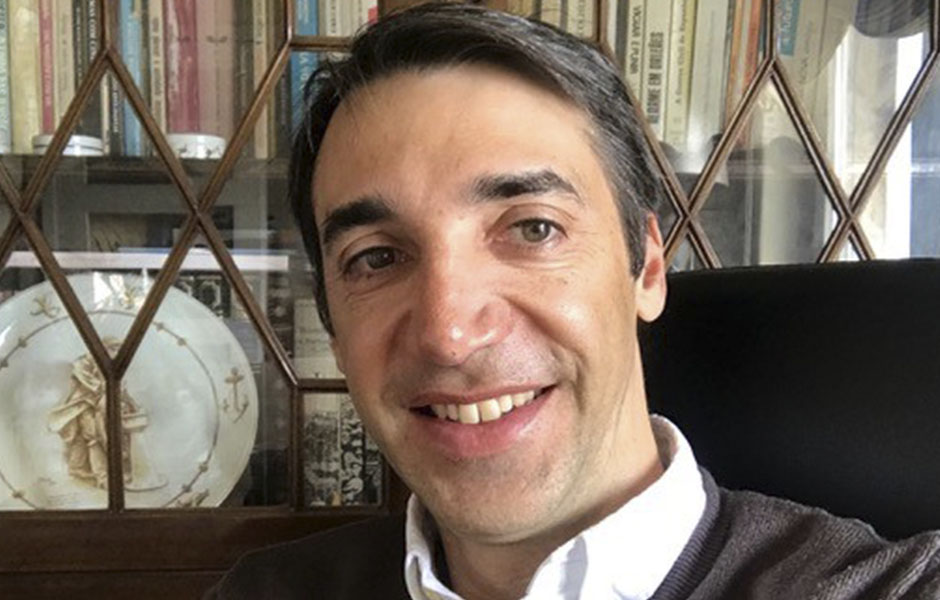From mental health in aging to human rights, through music and sport, there are many things that motivate him and that he is passionate about. Pedro Machado dos Santos is currently a CINTESIS researcher, clinical psychologist, a consultant at the Abel Salazar Institute of Biomedical Sciences (ICBAS-UP), international consultant for the World Health Organization (WHO), and professor.
He was born and studied in Lisbon, although his origins are in Aveiro. The family has a long tradition in the Navy (his father, grandfather, and great-grandfather were Commanders). He always combined his studies with music. He had formal musical education and plays double bass and piano. When he had to choose a career, he even took exams for the Naval School. And he made it. He also took exams for Music, with the same success. But it was Psychology that won the race.
“At the time, I was very hesitant. My brother followed naval engineering and architecture, although he now works in Formula 1. My mother, yes, had studied Psychology and always worked in social reintegration. At home, this very interesting duality was always present”, he recalls.
During college he was a member of the Estudantina Universitária de Lisboa, taught music to junior highschool students in a Special Needs School and worked as Public Relations at EXPO’98. After completing his degree in Psychology at the University of Lisbon in 2000, he did an internship at the Idanha Health House of the Irmãs Hospitaleiras do Sagrado Coração de Jesus, where he would return to define the assistance strategy for integration in the (planned) Continued Care Network in Mental health.
“I found a population that had aged within hospital structures. I was interested in understanding how you age with chronic illness and, in particular, with chronic mental illness. In addition, I come from a family where grandparents were very important. The relationship between grandparents and grandchildren was very natural and very rewarding. I was lucky. It was never strange to me, on the contrary, it was a pleasure for me to deal with the elderly ”, he says.
He completed his Master’s Degree in Social Gerontology – Quality of Gerontological Services at the Autonomous University of Madrid, with internships in different Spanish centers, attended the European Master’s in Gerontology and, in 2010, completed his doctorate at ICBAS, under the supervision of Rocío Fernández-Ballesteros and Constança Paúl, who brought him to CINTESIS.
He specialized in crisis and catastrophe situations and was part of a team from the Non-Governmental Organization (NGO) Médecins du Monde that was in northern Sri Lanka supporting the victims of the 2004 tsunami in Southeast Asia. The region was plagued by armed conflicts, with protagonists such as the “Tamil Tigers” and, in addition, it was the stage for the recruitment of Al Qaeda. He confesses that, at moments, he feared for his life.
In 2020, he collaborated in the development of psychological counseling line of the SNS 24, as well as in the lines of the the Lisbon City Council and the Order of Pharmacists, following the COVID-19 pandemic.
He was a consultant for the Psychiatric Services Directorate for Mental Health and for the National Mental Health Program (DGS) and since 2019 he is international consultant of the WHO where he has been chosen to elaborate the Cape Verde’s National Strategic Mental Health Plan 2020-2024. He is a professor at the Lusófona University since he completed his PhD.
He still participates in the project “Music in Hospitals”, founded by the pediatrician and former Minister of Health Ana Jorge, in which he has contributed since the beginning, in 2006, training musicians, in a perspective of humanization and improvement of the quality of life of institutionalized people due to health or social fragility problems.
As a CINTESIS researcher and ICBAS consultant, he is responsible for technical assistance for the creation and implementation of the Municipal Mental Health Program for the city of Lisbon. He also developing a study, on the impact of COVID-19 on pharmacists, together with the Portuguese Order of the Pharmacists and the International Federation of Pharmacists (FIP), and continues to coordinate a study in the frameworks of the initiative “Friends in Dementia”, in conjunction with Alzheimer Portugal and DGS, regarding public perception and awareness of this disease.
1-Year Ambition
I hope to finish the Mental Health Program for Lisbon. It can contribute to changing the way people perceive Mental Health in large cities. I hope that we will be able to look further into health promotion and look beyond mental illness.
10-Year Ambition
I want to continue working on Mental Health policies with this multilateral record of involvement and co-construction of initiatives by the various stakeholders, in particular by the actual beneficiaries. Of course, always in the unconditional defense of human rights.
Life Beyond Research
In my free time, I want to continue making music, with my family and friends (I am lucky that many have this passion and some of them are professional musicians).
Music has always been part of family life and dynamics. My father also played and we had many moments of sharing. Now, I maintain this dynamic with my nephews and my children, who have been playing the violin since a very early age. Musical interpretation is, for me, a matter of affection.
I want to play more! I miss sports and playing, a lot. I particularly like team games. I used to play volleyball at the Lyceum. A few years ago, I started playing golf, but I can’t always find the time. I would also enjoy sailing more with my kids and doing other things I did when I was a kid and, of course, I don’t want to lose that. It would be nice if I could continue participating in concerts, with Choirs and Orchestras, at least once a year. I feel that I will move away from my genetics if I do not do music or sports with family and friends.

